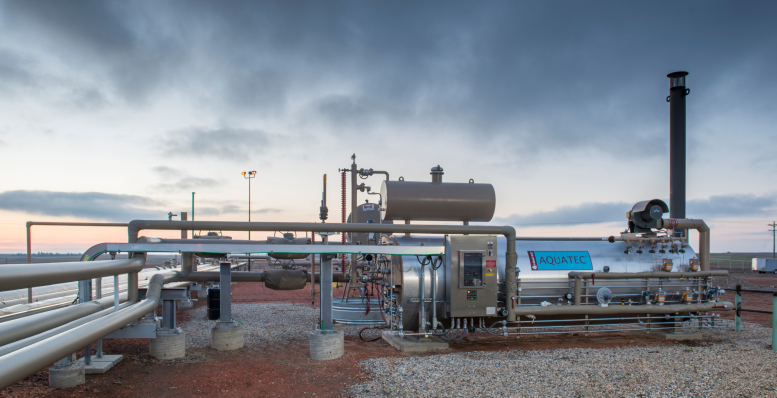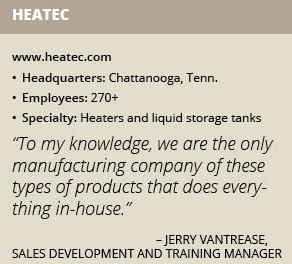
Heatec
Heatec’s name has become synonymous with the quality and reliability of its broad line of heaters and liquid storage tanks that have served asphalt plants and terminals for more than 40 years. As a recognized leader with a stellar reputation, the company has expanded its reach into new industries and is investing in infrastructure to keep up with demand.
“Asphalt plants used to be the majority of the business, but now the industrial side has grown to capture more than half of our business,” Sales Development and Training Manager Jerry Vantrease says. “The remaining 20 percent of the business is parts and service.”
Heatec’s parent company is Astec Industries, which was founded in 1972 with the vision to apply creative thinking and state-of-the-art technology to traditionally low-tech industries. Based in Chattanooga, Tenn., Astec specializes in building asphalt plants and was making heaters at its facility until demand greatly increased. As the company continued to gain market share, it formed Heatec in 1977 to oversee the development and manufacturing of heaters and liquid storage tanks.
Heatec’s products are used at facilities that produce and supply materials for road construction, mostly hot-mix asphalt plants and terminals and emulsion terminals. Outputs of the heaters range from 0.75 to 80 million Btu per hour. Tanks are either vertical or horizontal configurations with capacities ranging from 5,000 gallons to 45,000 gallons.
In addition to road construction, Heatec discovered its heaters were valuable in other industries including the textile, chemical and oil and gas industries and for use in the production of roofing shingles. The company also provides heaters and liquid storage tanks to the oil and gas and food industries. “New applications for the heaters and related products have continued to grow,” Vantrease says. “Heatec products are used in a score of different industries.”
Built to Last
Heatec’s heaters and liquid storage tanks are custom-built to meet each customer’s specifications. “Our customers know they are going to receive a heater that they can start and forget about for a while because they don’t need to worry about whether it will continue to run,” Vantrease says. “We still have heaters from the 1970s and ’80s running in the field. That in itself has a positive effect because our customers know they have something that’s going to run for a long time.”
The company does keep some stock equipment in case of emergencies. “An asphalt plant building a road can’t wait six to eight weeks for us to build one for them if a heater goes down,” Vantrease explains. “The road has to get done, so we have stock heaters that we can ship overnight.”
Heatec employs 32 engineers who focus on designing every piece of equipment its customers order. The salesperson, engineers and manufacturing team will meet to ensure everyone understands what the customer has ordered. The engineering team will then create a mock-up of the product, which is sent to the customer for final approval on larger orders. “The main thing that differentiates us is that we listen to our customers and if they have certain wants and needs, we try to build those into our products,” Vantrease adds.
 Once the plans are approved, manufacturing begins and Heatec builds every component in-house that will go into the heater or storage tank, except for motors. “We build the electrical panels, coils for the heater and build to specific codes,” Vantrease says. “To my knowledge, we are the only manufacturing company of these types of products that does everything in-house. We build it all here and put it together here, so when the customer gets it there is no question of whose product it is, which is another reason why our customers like our equipment.”
Once the plans are approved, manufacturing begins and Heatec builds every component in-house that will go into the heater or storage tank, except for motors. “We build the electrical panels, coils for the heater and build to specific codes,” Vantrease says. “To my knowledge, we are the only manufacturing company of these types of products that does everything in-house. We build it all here and put it together here, so when the customer gets it there is no question of whose product it is, which is another reason why our customers like our equipment.”
Inside the company’s 100,000-square-foot manufacturing facility, quality is of utmost importance. “Everything that leaves here is inspected,” Vantrease notes. “We have a quality assurance department that oversees quality control and ensures our heaters are up to code. We have a lot of heaters out on the oil rigs in the Gulf of Mexico, and they require explosion-proof motors, for example, so certain codes have to be met.”
In addition to the shop floor employees who are responsible for quality, the company also hires a third-party inspector to put an additional stamp of approval on its products. “Everyone at the company is responsible for quality and we ensure that so when the product goes out it’s right and the customer can turn it on and it runs,” Vantrease says.
Specialized Workforce
Today, Heatec manufactures about 150 to 200 heaters per year, making roughly three to four per week. It is one of a few heater manufacturers that have code capabilities. Seventy-five to 80 percent of the company’s manufacturing staff are welders. Of those, about 75 percent are code welders. “They can perform code-type welding and we hire for those capabilities,” Vantrease says. “If they don’t know how and want to learn, we have employees who will teach them how to improve and become a code welder. Code welding is not real common and we have to search for people with this skill.”
In Chattanooga, Heatec is competing against its sister company, Astec Inc., and Roadtec, another Astec Industries company that manufactures paving equipment, for welders. “The three of us compete, but they don’t have to have code welders,” Vantrease notes. “The way times are today, business is good and it’s hard to find people – especially for code welders.”
Heatec has an ongoing training program for its employees, which includes a major focus on safety. Every day the company holds two safety meetings – one for the morning shift and a second for the afternoon shift. The company also prides itself on having a dedicated team of experienced and highly trained service personnel who strive to give the best service available for asphalt heating and storage systems, fuel systems and industrial thermal fluid heaters.
Expanding its Reach
Heatec’s mission is “to grow and prosper by designing, manufacturing and selling the most innovative, productive and reliable equipment for the industries we serve, coupled with unparalleled service.” To continue growing, the company is looking to diversify because half of its business, the asphalt side, is dependent on federal infrastructure funding.
The company is looking to expand its reach by investing in international sales. “We have equipment installed in about 70 countries already and are investing in people we hire here locally to travel internationally, as well as hiring people already located in certain areas where we are trying to get more of our equipment into,” Vantrease explains. “The biggest area that we have is Australia and there is interest all over. It’s interesting when you get into international sales, Australia is the same size as the U.S. geographically and that’s just one part of the world. It’s a big world and we have to invest in people in those countries to sell our equipment.”
Heatec employs a direct salesperson who sells to Astec Australia, a subsidiary of Astec Industries, which then sells its products to the customer. The products are manufactured in Chattanooga and shipped out, which takes about one month to arrive in Australia. Heatec is also seeing an increased interest in Africa where Astec has a facility.
Astec is also looking to grow through acquisitions, which in some cases also benefit Heatec. “Three companies formed out of Astec and we have purchased 17 over the years. Astec’s family of subsidiaries are divided into three groups: infrastructure, aggregate and mining and energy,” Vantrease says. “We report in the energy group although a big portion of what we do is infrastructure. We are looking all the time to grow through acquisitions.”
One acquisition by Astec that benefitted Heatec was Power Flame, an innovative and forward-thinking force in the commercial combustion equipment industry that manufactures burners and combustion control systems. The company used to purchase burners from Power Flame for its heaters and now Astec owns the company. “We look forward to acquisitions and helping other companies, and Astec sees about 10 percent growth,” Vantrease notes.
Astec’s energy group also consists of Peterson Pacific Corp., GEFCO, RexCon and CEI Enterprises. The Astec family of companies has become America’s leading manufacturer of equipment for asphalt road building, aggregate processing, oil, gas and water well drilling, and wood processing.
In addition to its focus on international expansion, Heatec is also investing at home. The company invested in a growing line for its manufacturing facility that will allow it to build 50 percent more asphalt tanks in a year. The line was installed in November and required a reorganization of the facility to accommodate it.
Moving forward, Heatec plans to continue on its path to be recognized as the global leader in service, innovation, quality and safety of heaters and liquid storage tanks.